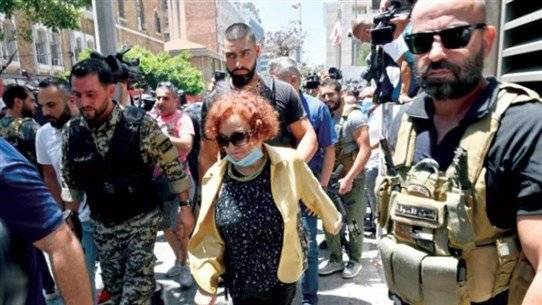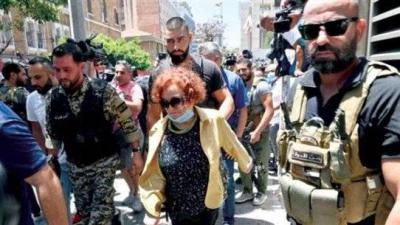The public prosecutor in Mount Lebanon, Judge Ghada Aoun, has once again refused to appear before the Higher Judicial Council to provide her testimony regarding her storming of the "Central Bank of Lebanon" headquarters in Beirut and her attempt to detain Governor Riad Salameh without coordinating with the public prosecutor in Beirut or obtaining prior permission. Instead, she sent an apology memo to the council justifying her reasons for not attending and providing her statement. Sources informed Asharq Al-Awsat that Judge Aoun justified her absence by stating that she was busy with important files and that her day was full of investigations that could not be postponed to accommodate the council's wishes. The source noted that "Aoun's excuse is unrealistic, as the council decided to postpone the hearing with her and three other judges to 3 PM, after official working hours, allowing the summoned judges to disengage from their duties." It was highlighted that "the public prosecution in Mount Lebanon (which Aoun presides over) is nearly paralyzed due to the open-ended strike of judicial assistants, making it impossible to conduct investigations without them."
Judicial authorities seem to have exhausted all means to deal with Aoun, who is associated with President Michel Aoun. The source explained that "this is not the first time she has refrained from attending the council and has ignored its recommendations and the orders of her direct superior, the Public Prosecutor Ghassan Oueidat," which has led to accusations against her before the Judicial Inspection Authority in several cases and subsequent referral to the judges' disciplinary council.
Aoun's absence did not distract the higher judicial authority from listening to her colleagues, as the council began its session by meeting with the public prosecutor in Beirut, Judge Raja Hamouch, who prevented Ghada Aoun from completing her work at the "Central Bank of Lebanon" and forced her to leave. A prominent judicial source confirmed that Hamouch "informed the council about what happened and how he was alerted to the arrival of the mentioned judge at the bank building with a force from the State Security apparatus without prior notice." The source noted that the public prosecutor "informed the council that he acted in accordance with the law, halted Judge Aoun’s encroachment on the jurisdiction of the public prosecution in Beirut, and put an end to the precedent of storming the central bank as a prominent institution of the state with its political and financial immunity."
The case of the Governor of the "Central Bank of Lebanon" was also a subject of concern for the Judicial Council, and it was discussed with the public prosecutor in Beirut, Ziyad Abu Haidar. The judicial source reported that Abu Haidar "provided answers to the council members' inquiries regarding the delay in bringing charges against Riad Salameh for several crimes including embezzlement, forgery, and illicit enrichment after receiving the file from the Public Prosecutor." Meanwhile, the session to hear from the Government Commissioner to the Military Court, Judge Fadi Akiki, held significant importance, as the military judiciary's pursuit of Bishop Moussa Al-Hajj, the patriarchal general deputy and the head of the Maronite Archdiocese of Jerusalem and Haifa, on suspicion of "violating the law of boycotting Israel and assisting agents in bringing in Israeli money, medicine, and products to Lebanon, as well as involvement in money laundering offenses, has stepped outside its legal context and created considerable confusion in political, judicial, religious, and public circles."
No information about the decision that the Higher Judicial Council will make was leaked from the meeting, as its deliberations remain confidential. However, a source in the council clarified to Asharq Al-Awsat that "Item (D) of Article 5 of the Judicial Authority Law states that the Higher Judicial Council has the right to hear from the judge regarding tasks that have stirred public controversy." The source indicated that the council "prefers to ascertain the reality of the matter from its source rather than receiving distorted news from outside," reminding that "the Higher Judicial Council is not an investigative judge nor an inspection body, and the law entrusts the council with the authority to examine the case files of every judge and request the Judicial Inspection Authority to conduct the necessary investigations and take appropriate measures."




